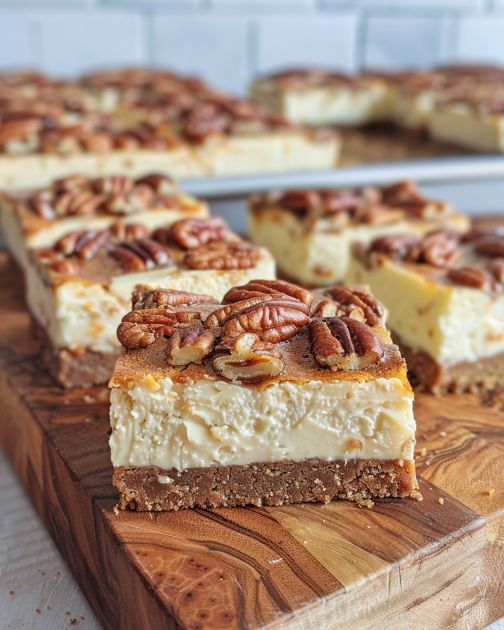ADVERTISEMENT

My hubby can never believe these are low carb! He can eat an entire tray!
– 16 ounces cream cheese, room temperature
– 1/2 cup granulated erythritol
– 2 large eggs
– 1 teaspoon vanilla extract
For the pecan topping:
– 1 cup pecans, chopped
– 1/2 cup unsalted butter
– 1/3 cup brown sugar substitute (such as a brown erythritol blend)
– 1 teaspoon vanilla extract
– A pinch of salt
Directions
1. Begin by preheating your oven to 350°F (175°C) and line a 9-inch square baking dish with parchment paper, leaving an overhang for easy removal.
2. In a bowl, mix together the almond flour, melted butter, erythritol, vanilla extract, and salt until a crumbly dough forms. Press this mixture into the prepared pan and bake for about 10 minutes or until slightly golden. Let it cool.
3. For the filling, beat together the cream cheese and erythritol in a bowl until smooth. Incorporate the eggs, one at a time, followed by the vanilla extract. Pour this over the cooled crust.
4. Return to the oven and bake for 20-25 minutes, or until the cheesecake is set but still slightly wobbly in the center.
5. While the cheesecake bakes, prepare the pecan topping. In a saucepan, melt butter with the brown sugar substitute, stirring until it’s well-combined. Add vanilla extract, a pinch of salt, and the pecans, coating them thoroughly.
6. Once the cheesecake layer is done, sprinkle the pecan mixture over top and bake for an additional 15 minutes.
7. Let the dessert cool to room temperature before transferring it to the refrigerator to chill completely. Once chilled, lift out from the pan, slice into bars, and embrace the heartiness.
Variations & Tips
– For those who fancy a bit more texture, a sprinkle of coconut flakes in the crust adds a delightful crunch.
– A drizzle of sugar-free caramel sauce can add a smackerel of extra indulgence for those special occasions.
– If you’re accommodating nut allergies, sunflower seed flour is a fine substitute for almond flour.
– Remember, when dealing with erythritol or other sugar substitutes, taste as you go—sweetness levels can vary